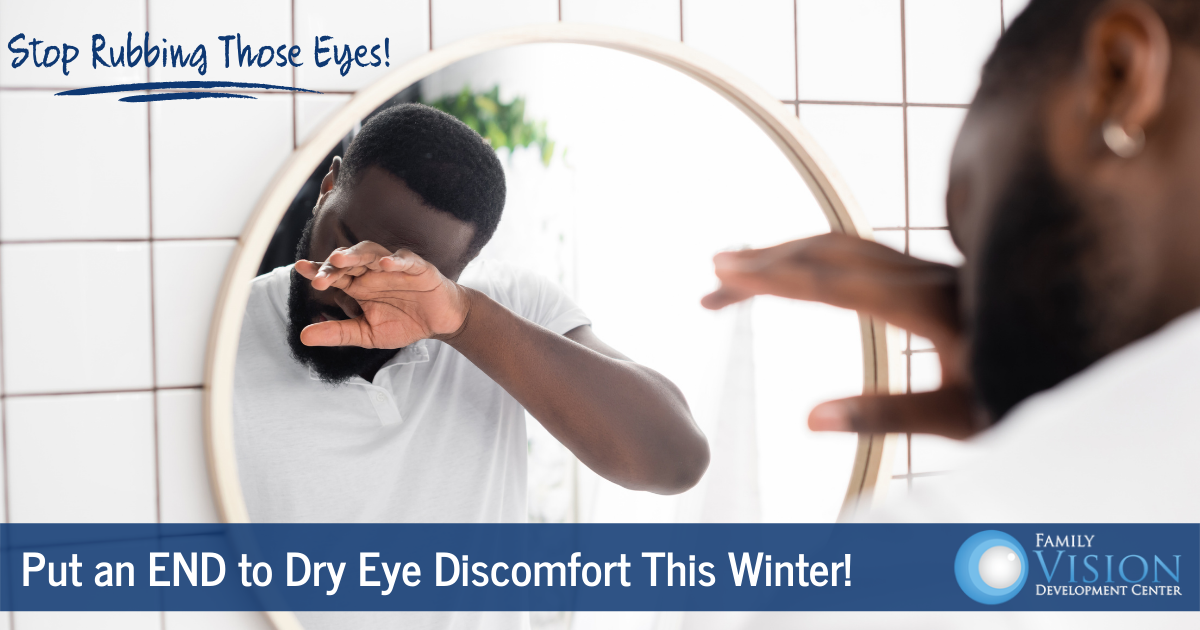Cold weather can have a drying effect on our bodies. When the temperature drops, our hair can feel dryer, our skin can get flaky and our eyes can get extra irritated. Dry eyes can cause you to experience redness, itchiness, grittiness, blurred vision or a feeling that there is something in your eye. Or conversely, it may also lead to episodes of excess tearing that follow periods of dryness, discharge or pain in the eye. There are a number of reasons that you might be experiencing dry eyes, and luckily there are also ways to treat them.
What Is the Condition Known as Dry Eye
Healthy eyes typically produce tears on a continual basis. These tears are made up of a mixture of water, oils, mucus and a large number of proteins. Tears are necessary to provide moisture and lubrication, protect against infection and keep the eyes comfortable. Dry eye occurs when the quantity or quality of tears fails to provide enough lubrication to the surface of the eye.
What Causes Dry Eyes
One common cause for dry eyes in winter is the amount of humidity in the air. In the colder months, the humidity drops outside. Additionally, turning on the heat at home evaporates the humidity inside. This leads to extra dry conditions which can have an effect on the eyes. It should be noted, however, that dry eyes don’t just happen in the winter months. There are other factors which can also contribute, including the following:
- Some medications have been known to cause dry eyes including antihistamines, decongestants, antidepressants and high blood pressure medications
- The natural aging process can cause declines in tear production, especially in people over 50
- Certain diseases such as lupus, rheumatoid arthritis, diabetes, thyroid disorders or Vitamin A deficiencies are associated with dry eyes
- Women are at a higher risk of developing dry eyes due to hormonal changes during pregnancy or menopause
- Environmental factors such as wind, smoke, dryness, or seasonal allergies can lead to dry eye
How to Find Relief for Dry Eyes
Now that you understand what causes dry eyes, it’s important to know what to do to find relief. Try these helpful solutions this winter to ease discomfort or prevent symptoms from worsening:
- Use a humidifier at home to increase humidity levels
- Drink a lot of fluids to keep your body (and eyes) hydrated
- Avoid blowing heat vents directly at your face
- Wear protective sunglasses to block blowing wind or dry air
- Use over-the-counter medications such as artificial tears to relieve mild symptoms
- Use prescription dry eye medications
- Use of certain products and procedures that can stimulate tear production
- Surgical options that partially or completely plug the tear ducts to slow the drainage of tears once they collect on the surface of the eye
Treat Your Dry Eyes Before it Gets Worse
At Family Vision Development Center, we understand that dry eyes are very uncomfortable and often painful. But more than that, we also want you to know that untreated dry eyes can progress to more serious conditions, such as eye infections, inflammation, abrasions, corneal ulcers or vision loss. Therefore, it is important to get diagnosed as early as possible. Through a comprehensive vision exam, we can determine the severity of your symptoms, as well as determine the most effective treatments so you don’t have to suffer through it any longer! Contact us at 630-862-2020 to learn more and to schedule an appointment.

